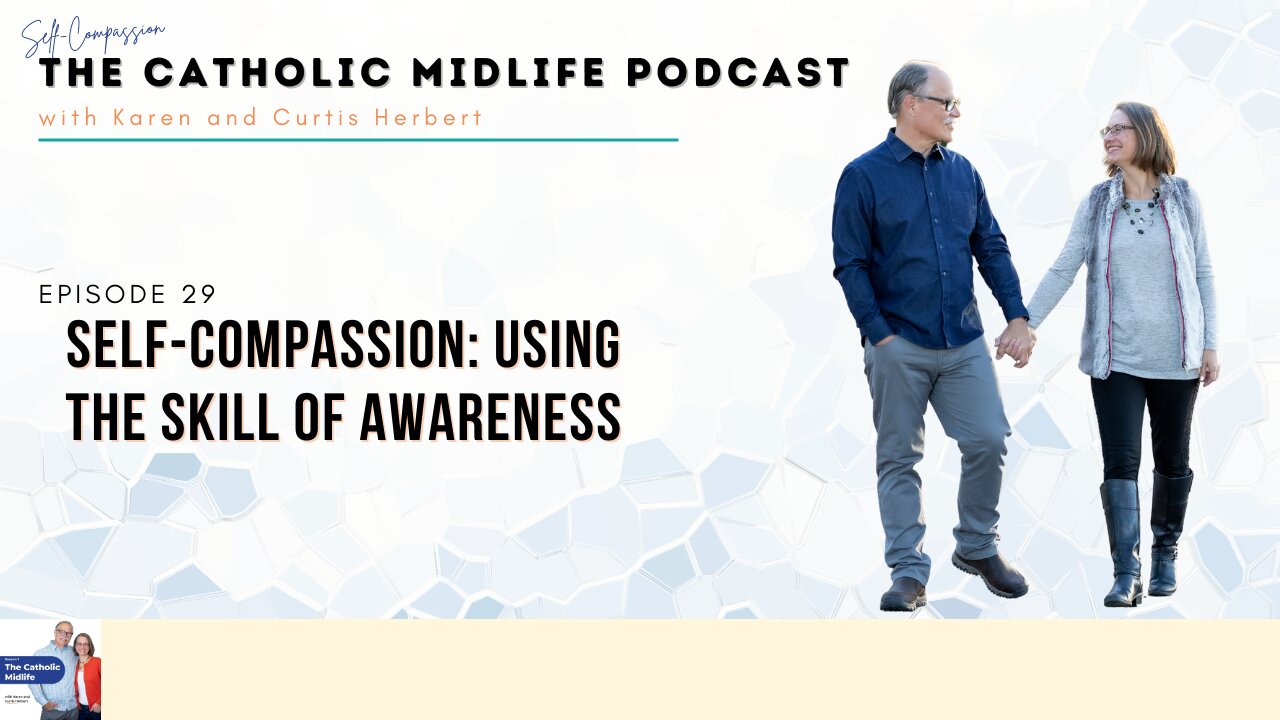Premium Only Content

Episode 29 - Self-Compassion: Using the Skill of Awareness
When am I supposed to practice the skill of self-compassion?
There are lots of chances every day! If you hate being late and you're being late to someplace - maybe your automatic reaction is I should have done “this” or “that” and why didn’t I and why am I so dumb? That's an opportunity to stop and use some self-compassion.
Maybe you need to make a difficult phone call and fear of looking dumb or creating conflict is holding you back. Self-compassion can help you embrace these fears and accept them so you can make the call.
Maybe you make a mistake at work. Like entering a wrong number in the chart of accounts. We tend to have an idea that we're never going to make a mistake. Or that, if we do, we are “bad.” We make plenty of mistakes… it’s a perfect opportunity to practice self-compassion.
And it’s for the big things. The really big things.
Things like areas of shame, areas of anger, areas of disillusionment… when you experience those huge paralyzing emotions often, that's where self-compassion is the skill that we reach for... To dig out and, and to being again.
Without interior peace, you can do little. With peace, you can be much more effective and it’s easier to hear the voices of wisdom and grace.
The fact is those emotions and stressors go somewhere. If you're not engaging with them in a positive and productive way, they're going to find some other outlet, and sooner or later you'll be experiencing its effects.
Self-compassion: think of this discipline when you are having negative emotions or strong emotions, or when you have a trial or a difficult situation that's causing you stress - or when you encounter your own weakness, something you're not good at. Think of self-compassion when you're suffering any instance of pain or suffering: physical, emotional, relational - those are opportunities for self-compassion.
AWARENESS is the first step in your self-compassion discipline
Awareness. You could also refer to awareness as mindfulness.
If someone is suffering, and you walk by, oblivious, there’s no opportunity to exercise compassion.
You have to see the suffering before you can exercise compassion. The suffering of the others around you. Your own suffering.
That’s really not the norm. You would think it is.
We often skip over the awareness of the suffering, pain, or discomfort. Moving straight to PROBLEM-SOLVING is one way to do that.
And we just keep moving…and don’t come back to that suffering. And we miss the opportunity to have compassion. And the consequent opportunity to put our best foot forward.
There are basically three parts to a discipline of self-compassion,
It's really hard to overstate the importance of this first part, the skill of creating awareness. More specifically, an awareness of what “is” without adding or subtracting from the reality of what God is allowing to happen now.
Do not judge, or you too will be judged. For in the same way you judge others, you will be judged, and with the measure you use, it will be measured to you. - Matthew 7:1
As we suspend judgment, we resist the temptation to make assumptions, generalizations, and distortions that make it harder to respond to what’s happening. As we make judgments, we are passing the situation into our brain’s network of past associations, opinions, us vs them thinking, and our own past hurts.
It also relieves us of the pressure of playing God. That’s a role that is hard for us, right? Talk about being underqualified!
Experiencing events without judging them is so helpful for interior peace! And it’s the first step in self-compassion.
Say This
When you DO notice a moment of suffering, difficulty, or overbearing emotion… try saying this to yourself:
“This is a moment of suffering for me.”
Acknowledge that you are having difficulty. Talk to yourself, kindly. The way a good friend that knows you and loves you would speak to you.
Drop us a line
Listen to the discussion on the podcast and join the conversation by emailing or texting us:
Text The Catholic Midlife podcast: 612-208-9150.
Email us: [email protected]
Facebook: https://www.facebook.com/groups/thecatholicmidlife
Instagram: https://www.instagram.com/thecatholicmidlife/
Website: https://thmlcoaching.com/podcast/
-
 21:42
21:42
The Empowered Catholic Podcast
1 month ago187 | What’s the Positive Energy? | The Empowered Catholic Podcast
291 -
 LIVE
LIVE
VapinGamers
1 hour agoKellan Graves - Fallen - Game Review and Game KeyGiveaway - !rumbot !music
93 watching -
 1:06:41
1:06:41
MattMorseTV
4 hours ago $32.28 earned🔴Trump PREPARES for WAR with VENEZUELA.🔴
36.2K51 -
 39:59
39:59
Clownfish TV
9 hours agoHollywood NO MORE! Animation Industry Will DIE First?! | Clownfish TV
6302 -
 25:57
25:57
The Kevin Trudeau Show Limitless
2 days agoThe Sound Of Control: This Is How They Program You
54.9K17 -
 47:41
47:41
Sarah Westall
3 hours agoNew Actions by Insiders Never Seen in History – Bitcoin Moves Ahead w/ Andy Schectman
18.3K2 -
 1:08:26
1:08:26
Glenn Greenwald
5 hours agoGlenn Takes Your Questions on Bill Ackman's Meddling in the NYC Election, Dems' Refusal to Endorse Zohran; MAGA Abandoning "America First," and More | SYSTEM UPDATE #537
108K29 -
 3:48:54
3:48:54
Nerdrotic
9 hours ago $25.35 earnedStar Wars is DEAD! | Is Hollywood Killing Pop Culture | WB for sale - Friday Night Tights 377
91.8K7 -
 LIVE
LIVE
SynthTrax & DJ Cheezus Livestreams
1 day agoFriday Night Synthwave 80s 90s Electronica and more DJ MIX Livestream Electronic Favorites Edition
150 watching -
 39:10
39:10
BonginoReport
12 hours agoPro-Life Journo Attacked In Lawless NYC - Nightly Scroll w/ Hayley Caronia (Ep.163)
94.6K26